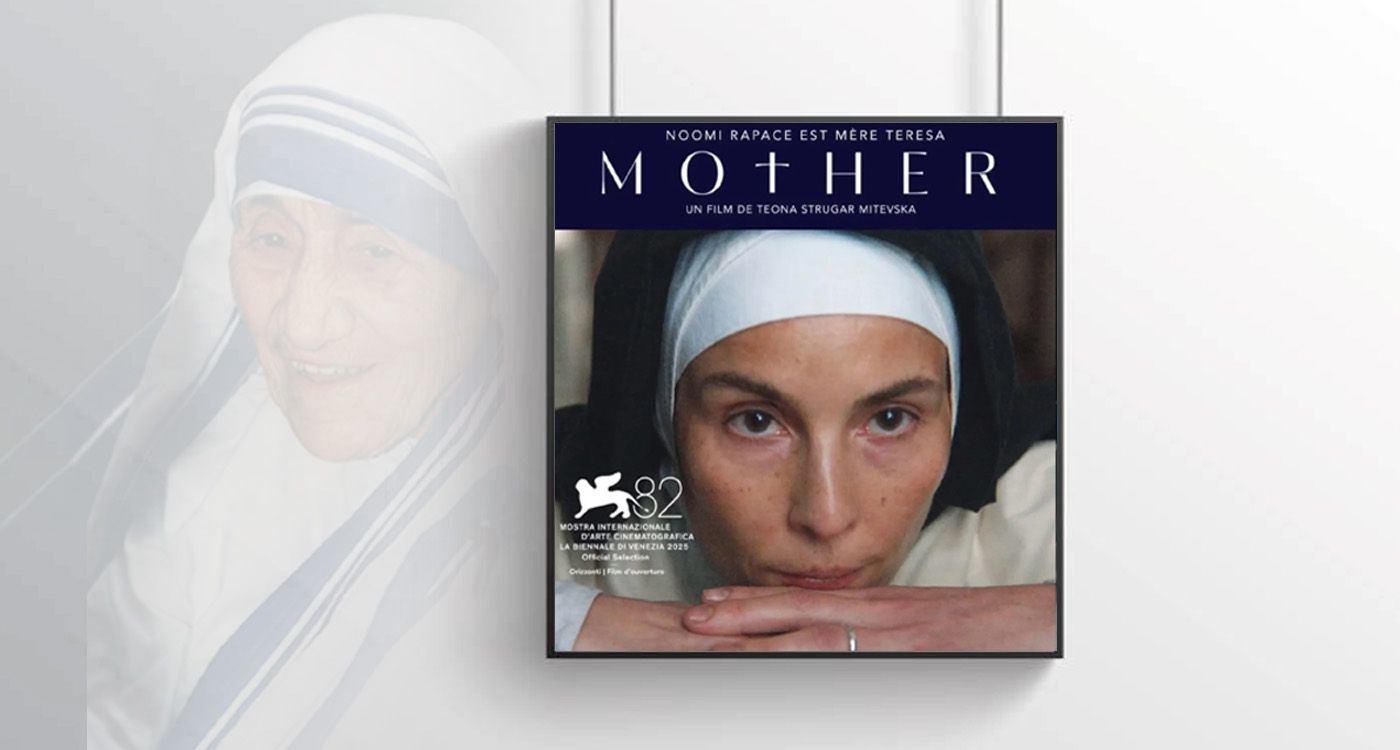
With Mother, Teona Strugar Mitevska offers a striking portrait of Mother Teresa, played by Noomi Rapace. Shown at the Venice Film Festival, the film retraces seven pivotal days in the life of a woman torn between doubt, faith, and devotion.
Who was the real Mother Teresa? In Mother, Macedonian director Teona Strugar Mitevska reexamines the legend to reveal a woman far beyond the clichés. Premiering in the Orizzonti section at the 2025 Venice Film Festival, the movie focuses on seven pivotal days in 1948 that forever changed Agnes Gonxha Bojaxhiu, the woman who would become Mother Teresa.
The story begins at the Loreto convent in Kolkata, where Teresa lives as a nun, torn between the comfort of the cloister and the relentless poverty outside. She makes a radical decision: to leave the convent, confront the city’s hardships, and found what will become the Missionaries of Charity. Alone in Kolkata for a week, she experiences doubt, fear, and exhaustion, while her faith falters and strengthens in equal measure. Mitevska captures this pivotal period with nuance, portraying Teresa in all her complexity, far from simplification or myth.
Swedish actress Noomi Rapace, known for her intensity, brings depth to the role. She portrays Teresa as fragile and determined, torn by her choices, often shaken, sometimes stern or silent. Mitevska intentionally avoids any sense of sanctification: Teresa is shown as a real woman who doubts, hesitates, suffers, and acts despite it all. Rapace describes her performance as “punk rock,” far removed from static or expected portrayals.
Shot in 2024 across Brussels and Kolkata, the movie anchors its story in iconic locations such as Howrah Bridge, Kalighat, the bustling city streets, and the Loreto convent. Some scenes carry deep emotional weight; one crucial set was destroyed by fire shortly after filming, giving the movie an added layer of authenticity.
Seven Days That Changed Everything
The screenplay, written by Mitevska, Goce Smilevski, and Elma Tataragić, draws on historical events but does not aim for literal reconstruction. It focuses on the human experience: solitude, the shock of the city, confronting indifference, and the struggle to forge a path beyond established norms. The film closely follows Teresa without embellishment as she grapples with understanding and action. Neither pious nor polemical, it explores the demands of total commitment, how to find one’s place, and how far to go to remain true to oneself.
Venice’s Orizzonti section, dedicated to innovative and original films, selected Mother to open the competition. This is Mitevska’s third film at Venice. She describes the project as the culmination of a long journey. “It took me twenty-five years to arrive here and make Mother, a film that fully reflects who I am. Mother Teresa was both strict and deeply maternal,” she explains.
Mother is the result of a European and Indian co-production involving Belgium, Macedonia, Sweden, Denmark, and India. This collaboration gives the film both visual and historical scope while maintaining intimacy with the character.
The movie builds on the earlier mini-series Teresa and I from 2015 but goes further in exploring the inner struggles and choices of the woman behind the legend. There are no miracles on screen, only a woman confronting contradictions, ready to step into the unknown out of faith and compassion. It also depicts the founding of the Missionaries of Charity in secrecy, solitude, and misunderstanding, long before Teresa became a global figure.
With Mother, Mitevska emphasizes that every legend begins with courage and uncertainty. By restoring Mother Teresa’s humanity, the movie presents a woman who was not instantly a saint but a seeker of meaning and a fighter in everyday life. At Venice, this nuanced portrayal captures the complexity of an existence caught between light and fragility.

Comments